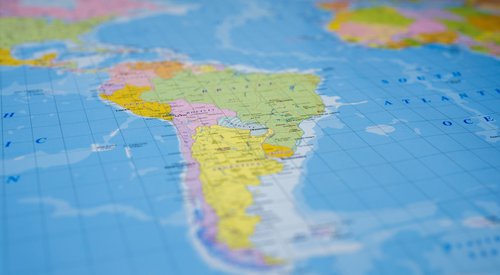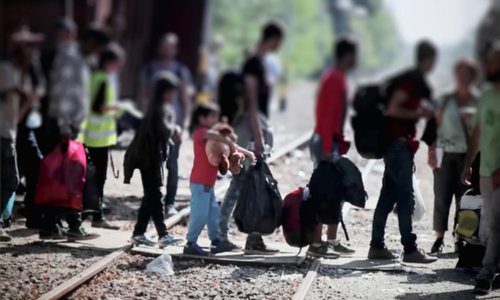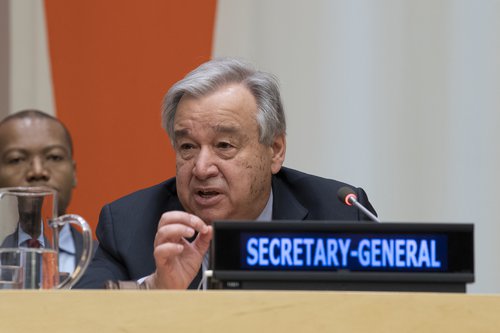Now more than ever, multilateralism and international cooperation are essential to face the crisis that Covid-19 unleashed. More so in Latin America, a very unequal and vulnerable region subject to the pressure of external debt, the recurrence of natural disasters and that, slowly, becomes the virus’ hotspot.
Cases tripled in one month, and, despite being home to just 8% of the world’s total population, Latin America recorded nearly half of the coronavirus-related deaths globally in the past two weeks, beating the figure of 100,000 deaths.
The Joint Summit Working Group (GTCC in Spanish) brings together 13 inter-American and international institutions. The GTCC is coordinated by the Organization of American States (OAS) and is made up of: the Inter-American Development Bank (IDB), the Development Bank of Latin America (CAF), the Economic Commission for Latin America (ECLAC), the World Bank world (WB), The Pan American Health Organization (PAHO), the Inter-American Institute for Cooperation on Agriculture (IICA), the Inter-American Bank for Economic Integration (CABEI), the Caribbean Development Bank (BCD), the International Organization for Migrations (IOM), the International Labor Organization (ILO), the United Nations Development Program (UNDP), the Organization for Economic Cooperation and Development (OECD) and the OAS itself. The group organizes, plans and executes projects that implement the summit commitments.
Since Covid-19 arrived in the region, the group has held three meetings to analyze the virus’ impacts and plan measures to support the citizenry. An online document was created on the first meeting to follow up on the actions that each institution plans to or is carrying out. Although many have been met, others have not yet received timely attention.
What has and has not been done on key issues
 Latinoamérica en el mapa. | Shutterstock
Latinoamérica en el mapa. | ShutterstockdemocraciaAbierta followed up on some of the region’s key issues and on the effectiveness of the measures agreed upon: protection of democracy, control of corruption, effective government measures, protection of human rights and flexibility of access to financial aid. These are our findings:
- Regular meetings to achieve continuous coordination between each entity and to update the region’s data. Accomplished, especially thanks to the work of the ECLAC Observatory.
- The national anti-corruption nodes that seek to comply with the Lima Commitment that promotes transparency, equity, judicial freedom and the strengthening of democratic institutions. Although the presence of the nodes was achieved in several countries, Brazil does not count with one: the most unequal country, with the highest number of Covid-19 cases in the region and the second highest in the world.
- Strengthen e-governance capacities. This strategy has been advancing, but, according to a study by Georgetown University, only 6% of projects are successful, 52% have problems, and 42% fail. A clear example is that of Ivan Duque’s, Colombia’s President, daily broadcast: every day, he broadcasts on all social networks and talks about the pandemic. However, the idea has created more confusion than it has helped, since every night he enacts more and more measures, so many that he – or anyone – no longer knows which are in place and which are not; this generates disinformation within the population. Therefore, although technology exists, the message’s clarity and quality is key for these types of tools to improve, and not deteriorate, governance.
- Support the approval and execution of public emergency funds, specifically to serve Covid-19. In this point, all fail: both multilateral entities and national governments. During the pandemic, reports of fraudulent ventilators, masks and other sanitary items’ purchases have surfaced, as well as irregularities in aid-delivery to vulnerable populations. Moreover, absurd political measures in Latin America are increasingly accumulating.
To list just two examples. The first is that of governors in Colombia, at least 14 out of the 32 governors have been investigated for crimes incurred in the context of the health emergency. The second case is that of the increase in the cost of body bags in Ecuador, which multiplied its price from $ 12 to $ 144 in Guayaquil, the city most affected by the virus.
- A list of actions and measures that the authorities must take into account in the development of the electoral processes to come in the context of the health emergency. This has not yet been created, and it will be key in the coming years since all of the region’s countries will elect new representatives. The entity in charge of doing this is the Department of Electoral Cooperation and Observation (DECO).
- The Inter-American Commission on Human Rights (IACHR) adopted on April 10, 2020, a resolution that makes a series of recommendations on the measures that must be taken to face the crisis. The resolution urgently calls for the implementation of a focus on human rights and that pays extra attention to extremely vulnerable people such as: older people, prisoners, women, indigenous peoples, LGBTI+, Afro-descendants, children and adolescents, and people with disabilities.
If the pandemic’s response does not include the effective protection of human rights, inequality and violence in the region deepen. According to a report by CEPAL, one of the members of the GTCC, inequality and violence of all kinds against women has been exacerbated during the pandemic: women are most affected by unpaid care work, suffer higher rates of underemployment, have greater difficulties in accessing financial benefits, and have less access to food, while cases of violence against women and girls have increased.
Another vulnerable population during the crisis is that of migrants. Before the arrival of the coronavirus, the region was already undergoing an unprecedented migration crisis, fueled by the Venezuelan exodus. Since 2015, more than 5 million Venezuelans have left their country and more than 4 million reside in countries in Latin America and the Caribbean. However, they are not the only ones, 12% of the population in Belize are immigrants from Central America; and in the last 10 years, Chile has granted around 275,000 visas to Haitian migrants. Now they face new problems, such as border closings and isolation measures.
 Migrantes en México. | Shutterstock
Migrantes en México. | ShutterstockOn the other hand, there is the crisis of indigenous and Afro-descendant populations in the face of Covid-19. In the region, there is a lack of access to public services and health products. Although most of these towns restricted access to their territories, in many cases it was an unsuccessful measure: the virus arrived and has had an incalculable impact on populations especially-vulnerable to viruses.
- With regards to financial support for the region, the World Ban anticipates that in the next 15 months its assistance to developing countries will reach 160,000 million dollars, and that a large part of this sum will help governments in Latin America and the Caribbean to better manage the emergency. Currently, nearly $ 2 billion has been distributed in the region to deal with the pandemic. However, a future with a skyrocketing unemployment rate and a historic rise in poverty will demand a much more robust financial support system for the region.
We have to set off the alarms now
On July 9, 2020, the Secretary General of the United Nations, António Guterres, warned that, as a consequence of the virus, Latin America will suffer a sharp drop in tourism, an economic contraction of 9.1% – the largest in 100 years – and a reduction in remittances that will leave the region with 45 million more people in poverty, compared to the 2019 figures. With this increase, the number of poor people in the region will reach 230 million, of which 28 would be in extreme poverty.
 Antonio Guterres, Secretario General de Naciones Unidas. | Centro de imágenes abierto de Naciones Unidas.
Antonio Guterres, Secretario General de Naciones Unidas. | Centro de imágenes abierto de Naciones Unidas.For Guterres, the development model of Latin America and the Caribbean needs to be rebuilt. “In a region where inequality has become untenable (…)” building a better tomorrow “demands strengthening democratic governance, human rights protection and the rule of law (…) At a time when too many citizens feel excluded, greater accountability and transparency are crucial”.
The role of the multilateral response to overcome this crisis is and will be key. So far, their support has not been sufficient. Financial measures need to be expanded to middle-income countries with payment extensions, debt payment deferrals and expansion of international money orders. Likewise, urgent measures must be created to protect human rights, stop corruption and improve democracy, always fragile in the region.
PrintDemocraciaAbierta | Radio Free (2020-07-10T00:00:00+00:00) These 13 bodies said they would counter the pandemic in Latin America – have they?. Retrieved from https://www.radiofree.org/2020/07/10/these-13-bodies-said-they-would-counter-the-pandemic-in-latin-america-have-they/
Please log in to upload a file.
There are no updates yet.
Click the Upload button above to add an update.